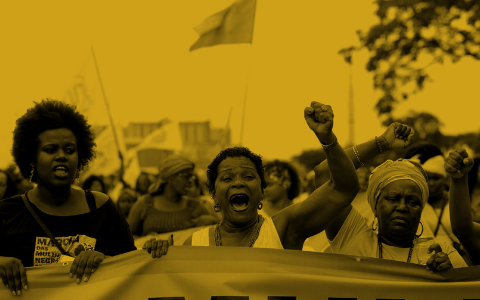Sur 28 to look at strategies to combat racism
17 authors from Africa, Latin America, the United States and Asia are to participate in the next edition of SUR.

On Black Awareness Day, Conectas Human Rights announces the focus of the 28th edition of the Sur Magazine on race and human rights. With the help of the Co-Editor Sueli Carneiro (Geledés), black, feminist historian, Sur 28 seeks to position the issue of race at the centre of the current human rights debate. Entitled Race and Human Rights: Changing Structures, Sur 28 has brought in over 17 authors to present a variety of strategies to combat racism, including ways of fighting against mass incarceration and discriminatory drugs policies, as well as how to support racial equality in the sector of philanthropy and in human rights organisations. The Executive Editor of this issue is Thiago Amparo (FGV Law in Sao Paulo) and the Assistant Editor is Maryuri Mora Grisales (Conectas).
For the first time, Sur Magazine is providing writing grants to black authors, in an attempt to encourage and support them in writing about their experiences and research in the area of racism and human rights in the Brazilian context. A total of 850 proposals were received from all over the country. Megg Rayara Gomes de Oliveira, Aline Maia Nascimento and Rosane Viana Jovelino were the three authors selected to receive the grant. The winning proposals touch on the invisibility of transvestites and transsexual women in the black movement, the experience of people’s courts for murder cases of black youths and the development of quilombola communities. As well as being researchers in their own areas, the three authors bring their unique perspectives on the themes to Sur 28, as a black transsexual woman, an activist in the state of Rio de Janeiro and a quilombola from the Bacia and Vale do Iguape, Bahia.
In addition to the texts presented by those who won the writing grant, Sur 28 also has a collection of themes that are relevant to the current debate on racism and human rights. Some authors look into the role of white privilege, dynamics of power and racial equality in the area of philanthropy and human rights organisations. Among them are the UN Rapporteur on racism Tendayi Achiume; the Ford Foundation Director from South Africa, Nicolette Naylor; the Campaign Director at Open Society Foundations, Sue Gunawardena-Vaughn and the Director of the NGO, Ação Educativa, Denise Carrera.
Read more
Other authors talk about the intersection between race and criminal policy and anti-discrimination law, including themes such as drugs policy, the criminalisation of abortion for black women, inadequacy in the Brazilian anti-racism law and mass incarceration. Authors writing on these themes include the researcher Juliana Borges; The Rio de Janeiro public defender, Livia Casseres; Lecturer Thula Pires and activists Nathália Oliveira and Eduardo Ribeiro. The Latin American debate is also represented in the Sur Magazine with contributions on strategic litigation on racial discrimination in the workplace in Colombia and the debate on race and human rights in the American system, with contributions from Mariluz Barragán (Colombia) and Roberto Rojas (Peru).
Sur 28 is also launching a new section on art. In partnership with the directors of the film Auto de Resistência (2018), Natasha Néri and Juliana Farias, Sur 28 will publish a documentary about the struggle of mothers of young black people killed by the police. Sur will also be publishing a video interview with the author Kimberlé Crenshaw, an important North American feminist who designed one of the pillars of the theory of intersectionality. Finally, still in the art section, Revista Sur will be bringing works selected from the exhibition Afro-Atlantic Stories, with plays by black actors with comments from the researchers Lilia Schwarcz and Hélio Menezes and a text about art and acting by the artist Diane Lima.
Sur 28, still in the preparation phase but to be published in December 2018, seeks to contribute to combatting racism in the Global South, by showing the diversity and wealth of vision on the subject as well as the strategies to combat racism.






